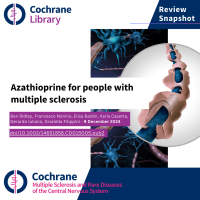
On December 9, 2024, our team published a new Cochrane Review exploring the benefits and risks of azathioprine, a medication that affects the immune system, for people with multiple sclerosis (MS).
Kudos to the amazing team: Ben Ridley, Francesco Nonino, Elisa Baldin, Ilaria Casetta, Gerardo Iuliano, Graziella Filippini.
Key Findings
The review aimed to assess whether azathioprine provides better outcomes compared to other treatments for MS, such as interferon, or no treatment at all.
- It is unclear if azathioprine (medication that affects the body's immune response) provides more benefits overall than other medicines for multiple sclerosis, like interferon (natural proteins made by the body to treat infection). Azathioprine may reduce the number of people experiencing relapses compared to interferon.
- Over two years, people taking azathioprine may be more likely to experience serious harmful effects than those on interferon.
- Azathioprine may increase nausea or vomiting, but its effects on disability progression, short-term side effects, or quality of life remain uncertain due to limited evidence.
What is multiple sclerosis?
Multiple sclerosis is a lifelong condition, affecting the brain and spinal cord. Its symptoms vary widely, can be mild or severe, and include tiredness, pain, muscle cramps, and reduction or loss of sensation and strength in parts of the body.
MS typically affects young people, mainly women, and is often first diagnosed between the ages of 20 and 40. The most common form is relapsing‐remitting MS, where symptoms come and go. Progressive MS is characterized by a gradual worsening of symptoms over time.
How is MS treated?
While there is no cure for MS, many medicines can reduce relapse frequency and slow the progression of disability. Azathioprine is sometimes used in countries with limited treatment options, even though it is not currently licensed for MS.
What did we want to find out?
We were interested in the benefits and harms of azathioprine, either as a first treatment choice or as an alternative when other medicines did not work or were not wanted.
What did we do?
We searched for studies comparing azathioprine to other treatments, placebo, or no treatment. We reviewed 14 studies (8 randomized trials and 6 non-randomized studies) involving 2105 participants with relapsing-remitting or progressive MS. Most studies involved women (57-83%), with an average age of MS onset between 29.4 and 33.4 years.
The quality of studies is low. The evidence does not address all the comparisons we were interested in.
Future Directions
Future studies should last longer than two years, focus on outcomes important to people with MS (like quality of life and cognitive status), and include more participants with progressive MS.
How up to date is the evidence?
The evidence is current up to August 9, 2023; the most recent included study is from 2014.
For more details, read the full review here: Azathioprine for people with multiple sclerosis
